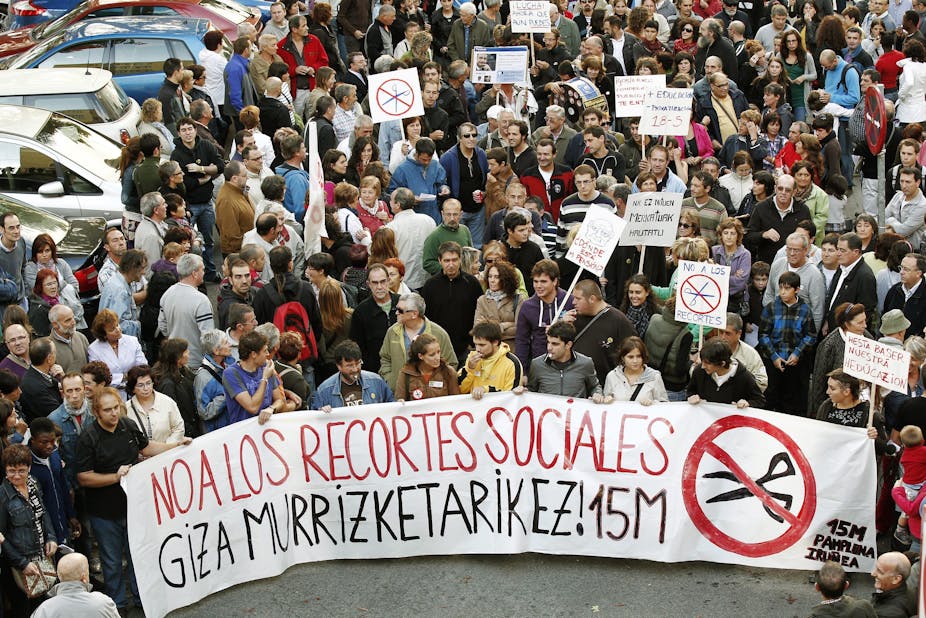This weekend Spain will see the return of its “revolution”. Those involved in the 15-M movement will once again take to the streets en masse to demand urgent reforms. Under the motto “united for a global change,” the latest series of demonstrations will this time have a global dimension, with events taking place in 45 countries.
The movement has been organised through social media with the slogan “It’s time for us to unite. It’s time for them to listen. People of the world, rise up!”. Protestors will put pressure on the political representatives in each country to direct us towards a democracy that isn’t undermined by financial power.
Roots of protest
15-M is a non-partisan, movement which attracts people from all social classes. It grew from a wave of non-violent protests which started on May 15th this year, and its campaign for reform of the political system has swept throughout Spain. It doesn’t want to overthrow the system – merely reform it.
It was inspired by protests in Iceland, took hold in Spain, then spread to other countries throughout the world. We now see the power that motivated demonstrators can mobilise via social media with the #OccupyWallStreet protests. 15-M is a movement which has stimulated protest well beyond its borders.
Spanish issues
The Spanish public has had enough. People are fed up with the high unemployment rates (over 20%), corruption in politics, and cuts to public spending. Politicians have been cited as Spaniards’ third biggest concern for two years (even over ETA’s terrorism).
The political structure is marked by a two-party system dominated by PSOE and PP. This is perpetrated by an electoral system that drowns any real option that small parties may have.
Citizens power
Social media have now revolutionised the public’s ability to protest.
Citizens are now expressing their political discontent, demanding the transformation of democracy. They are marching in the streets, taking part in saucepan-banging demonstrations, halting evictions, online petitions, cycling protests, and putting one foot in front of the other in the popular “long walks for democracy” (the latest one saw people marching 1500km from Madrid to Brussels).
And of course there are the campsites for democracy. Madrid’s Puerta del Sol was the epicentre of these protests, inspiring copycat tent cities in over 50 city squares around the country.
Confidence in change
These people are displaying not only their indignation with what is happening around them, but also their conviction that things can be changed by citizens power.
Their agenda incorporates everything from establishing monitoring mechanisms in the banking and financial systems, finding ways to improve civic participation in politics, fiscal reform to raise tax rates on big fortunes and a reform of the electoral law that guarantees the principle of equal voting.
After five months of practice, this weekend’s demonstrations will throw up some novelties. It’s the first time protests are being organised simultaneously in 45 countries that share central issues like the weakening of democratic systems by the markets.
General election
Coming just a month before the general elections on the 20th November, politicians will be all too aware of the outrage.
Many of the movement’s demands haven’t been seriously debated by political representatives who claim that it is impossible to incorporate complex measures that may involve a change in the “immovable” Spanish Constitution.
But neither of the main parties hesitated to change the very same Constitution in August, when they sped through legislation to limit public deficit in order to calm the markets, the European Central Bank and the European Union’s Franco-German core.
The 15-M movement must now show it will not give up, and that it is prepared to face down dismissals from mainstream politicians, such as Esperanza Aguirre’s (PP) and Duran i Lleida’s (CiU), who brand it “anti-system”.
15-M will be back on the streets this weekend to show that democracy can’t be left in the hands of a few political and financial elites who try to limit citizens’ understanding of politics.

